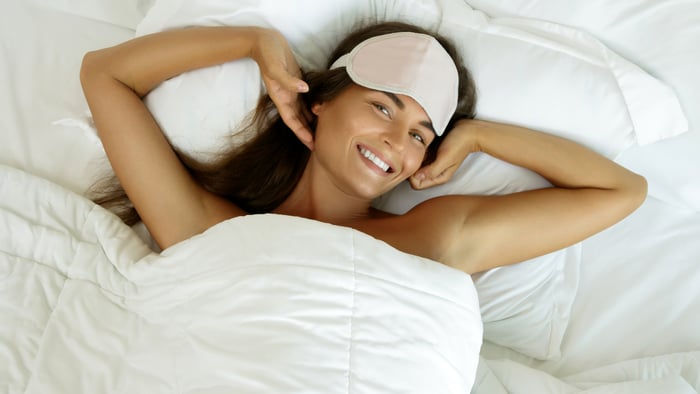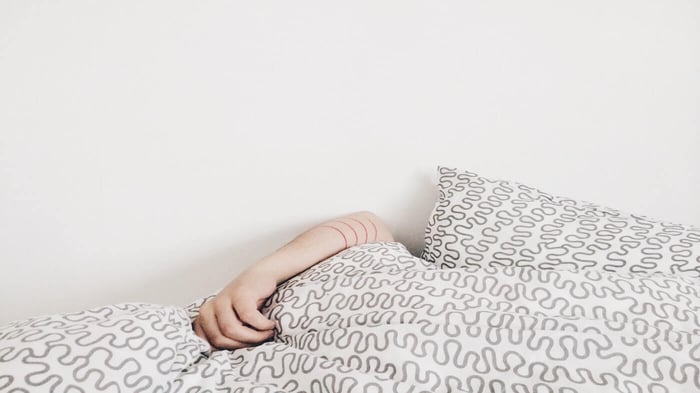Nighttime should be a time for relaxation: You brush your teeth, climb into a cozy bed, perhaps you read until your eyelids get heavy, and then you drift off to sleep and wake up refreshed about eight hours later.
But let’s be realistic. How many people actually achieve that ideal scenario ever, let alone every single night?
For many people, bedtime is more a source of stress than relaxation. When you know you’re going to be lying awake, feeling restless, stressing out about how tired you’ll be the next day, and perhaps resenting your partner, your children, or the family dog for any noisy disruptions throughout the night, you may begin to realize you have a problem.
At the very least, you can find some peace knowing you aren’t alone. Over a quarter of adults reach for melatonin to help them drift off, and more than half of CBD users in the United States report taking their supplements to help them sleep better.
But are these sleep aids beneficial, or could they be more trouble than they’re worth? Do the side effects outweigh the benefits? And perhaps most importantly, the next time you’re staring at your ceiling and wishing for sleep, which supplement should you reach for?
Let’s take a look at both sides of the CBD vs. melatonin equation, so you can feel confident you’re choosing the best one for your needs.
CBD Vs. Melatonin For Sleep
What’s the difference between melatonin and CBD?
Melatonin is a hormone that the body naturally produces. It’s closely associated with our circadian rhythms. When the sky begins to darken, our bodies ramp up the production of melatonin to prepare us for sleep. It falls again during the second half of the night to allow us to wake up hopefully feeling refreshed and ready for the day.
In individuals with normal melatonin levels, this cycle happens nearly the same way every night. Some people don’t produce melatonin on the right schedule, however; or, even if the timing is correct, they may not make enough melatonin to assist with reliably falling asleep and staying asleep.
CBD, on the other hand, is not a hormone or a substance the body produces naturally. It’s a compound found in the hemp plant that has been used for thousands of years — at least — since humans learned that cannabis plants caused calming effects when smoked or ingested. The use of CBD isolated from the rest of the cannabis plant is relatively new, having taken hold sometime after the Second World War, when scientists first separated CBD into its own compound. The rest is history; users have been enjoying CBD’s soothing effects ever since.
Why are they both commonly used as sleep aids?
Since melatonin acts directly to control your sleep cycle, it makes logical sense that taking supplements to increase your melatonin levels would boost these sleep-inducing benefits. Indeed, melatonin supplements do lead to higher levels of melatonin within one to two hours after ingestion, and users do typically have an easier time falling asleep or staying asleep.
Melatonin can be great for short term, every-once-in-a-while use. Taking melatonin every night for an extended period of time, however, may lead to further problems.
CBD, on the other hand, works by restoring your body to a state of natural homeostasis. It doesn’t artificially inflate your melatonin levels, but it can help to even out imbalanced brain chemicals. Essentially, CBD encourages your body to act in a way that it would if all of your systems were functioning normally.
This happens because our bodies and brains have an endocannabinoid system with receptors heavily concentrated in the brain and central nervous system. These receptors bind to your body’s naturally produced endocannabinoids — not to be confused with plant-derived phytocannabinoids, such as CBD — and interact with all of the body’s systems associated with maintaining homeostasis, or a natural state of balanced hormones and neurotransmitters. The endocannabinoid system can affect everything from regulating your sleep cycles to controlling pain, stress, inflammation, adrenaline, and even appetite.
Fascinatingly, the endocannabinoids produced by the body are chemically very similar to the phytocannabinoids found in the hemp plant. When you take phytocannabinoids such as CBD, THC, and others, these substances will bind to your receptors and mimic the actions of your natural endocannabinoids. Hence, they can restore balance to your system by flooding your body with chemically similar substances to the ones it uses to naturally stay healthy and relaxed.
What are the drawbacks of using CBD or melatonin for sleep?
Melatonin is associated with some significant drawbacks, depending on the person. Some people experience nightmares or intense, stressful dreams whenever they artificially boost their melatonin levels. Others report feeling groggy or dull in the mornings, even if they appear to have slept well.
Other side effects associated with melatonin include headaches, dizziness, nausea, itchy skin, night sweats, and arm or leg pains. Rarely, some people find that melatonin worsens their symptoms of depression or causes vertigo, blurry vision, and unexplained bruising or bleeding.
One of the most common problems with melatonin is that users can quickly build up a tolerance and become dependent on the supplement. For people with an existing melatonin deficiency, this makes sense; if you withdraw the treatment, the original condition will likely come roaring back.
However, people with healthy melatonin levels who take additional melatonin when it isn’t truly necessary can build up a tolerance to melatonin beyond the threshold their bodies naturally produce. This means when they stop taking melatonin and their levels fall back to normal, they can suddenly develop sleep disruptions that weren’t there before.
Perhaps most disturbingly of all, melatonin has been shown to disrupt reproductive hormones. Because melatonin is itself a hormone, it can upset the body’s delicate hormonal balance if you artificially boost melatonin levels without addressing the body holistically.
Even if you’ve had success in the past using melatonin, or you aren’t worried about the side effects, be cautious choosing your supplement. Random samples of melatonin products found that supplements can contain anywhere from 80% to as much as 500% of the dosage listed on the label. Even if you stay within the same brand, you might have wildly varying experiences if the company changes its formula from batch to batch.
In contrast, there aren’t many drawbacks to using CBD for sleep that we’re aware of. Most people report positive effects of stress relief, reduced anxiety, and a feeling of calm that helps them clear their minds long enough to drift off. When users do report side effects, they’re usually mild, such as dry mouth and drowsiness.
There is one potential downside that can’t be overlooked, however. The most effective CBD supplements for sleep are full-spectrum, meaning they contain trace amounts of THC in addition to CBD and the other cannabinoids. If you must undergo drug testing for any reason, you’ll want to steer clear of any supplements containing THC, even if the THC is a relatively tiny proportion of the total formula. THC can cause a positive drug test result up to several weeks after ingestion, so be cautious even if you plan to use your sleep supplement sporadically.
If you’d like to try a CBD supplement for sleep but you need to avoid products with THC, you can always try a CBD isolate product. CBD isolates contain only CBD, with no other cannabinoids present, so they will not trigger a positive result on a drug test. Though isolates have a reputation for being somewhat less potent than full-spectrum products, many people take CBD isolates for sleep with great success.
CBD products do not cause dependence. They can safely be used long term or intermittently, as needed, without disrupting your sleep on nights you don’t take it.
Regardless of whether you opt for melatonin or CBD, be cautious if you’re also taking additional medications. It’s a good idea to double-check medication interactions before taking anything new, just to be safe.
Is CBD better than melatonin for sleep?
It depends on why you’re having trouble sleeping and the side effects you’re willing to endure.
If you know you have a melatonin deficiency, meaning your body doesn’t produce enough melatonin or it produces melatonin on the wrong schedule, it might help to try a melatonin supplement. In this case, you’re simply replacing melatonin in your system that should have been there in the first place if your hormones had been functioning optimally.
Consider, however, that melatonin insufficiency is a sign that other hormones may be disrupted in your system as well. It also means you may have an underlying condition that’s throwing your melatonin cycle off balance. Rather than simply masking your symptoms with a melatonin supplement, you may want to see a doctor to rule out conditions that could be contributing to your difficulty sleeping.
If you’re worried about the side effects of melatonin, you want a supplement that you can safely use long-term without developing a dependence, and/or you suspect your difficulty sleeping may be due to stress or anxiety, CBD should be your top choice.
Additionally, if you’ve already tried melatonin in the past and found that it did very little for you — or if it worked at first, but the benefits quickly tapered off with continued use — that’s a sign your sleeping difficulties likely aren’t due to a melatonin deficiency. In this case, you’ll want to opt for CBD or any other option aside from melatonin. Attempting to take melatonin on a regular basis when you already have normal levels of this hormone increases your chances of dependency and therefore withdrawal when you eventually stop using the supplement.
Finally, consider how frequently you experience sleep disturbances. If you have insomnia almost every night, you’ll want to supplement with a product that’s safe for daily use. This means CBD would be the better choice. If you only occasionally have trouble sleeping and you plan to use a sleep aid every once in a while, you’d probably be safe to take either one.
Melatonin vs. CBD sleep supplements: Do you have to choose just one?
Technically, there’s nothing to stop you from popping a melatonin tablet alongside a dose of CBD. Some CBD manufacturers even include melatonin in their sleep blend formulas. The reasoning here is that CBD and melatonin act on different systems within the body, so taking both substances at once should boost effectiveness and increase the likelihood that a given user will have a good night’s sleep.
In the short term, this can and usually does work. However, as we’ve discussed, long term use of melatonin can actually make sleep issues worse instead of better. This means, therefore, that any CBD product containing melatonin would not be suitable for daily use.
Theoretically, you could use a CBD product on a nightly basis and reserve melatonin for the times when you’re having extra trouble sleeping. However, if you find a high-quality CBD product that effectively improves your sleep, these nights should occur very infrequently — if at all.
For high-quality, thoroughly-tested CBD products to help you drift off, try Butler Hemp Co.
We acknowledge that melatonin supplements do have benefits for many users. But given the substantial risk of drawbacks, we do not include melatonin in any of our products. Instead, we focus on producing only pure, safe CBD oils, such as the oil we use in our Sleep Blend Full Spectrum product.
Our Sleep Blend is a gentle, calming way to quiet your mind, fall asleep, and stay asleep all night long. It provides the usual benefits of CBD with an added boost from CBN and CBG, cannabinoids which are reputed to have even better sleep-aiding effects than CBD alone.
Just keep in mind, our Sleep Blend is a full spectrum oil that does contain low levels of THC. You won’t experience any feelings of a “high,” but you might want to opt for our THC-free products if you have to face a drug test in the near future.
Butler Hemp Co. is always happy to answer any questions you may have about our products, dosage, manufacturing process, or anything else. You can contact us easily here, and we’ll get back to you as soon as possible.




